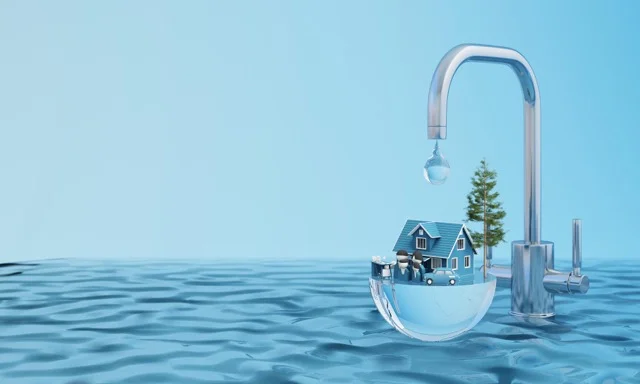The Buzz on Reclaim Waste
The Buzz on Reclaim Waste
Blog Article
The 30-Second Trick For Reclaim Waste
Table of Contents4 Easy Facts About Reclaim Waste DescribedUnknown Facts About Reclaim WasteReclaim Waste Things To Know Before You Get ThisReclaim Waste Fundamentals ExplainedAll About Reclaim Waste
Domestic sewage waste refers to the waste and products from a household septic storage tank. The appropriate administration and disposal of residential sewage waste call for fluid waste to be moved to a sewage treatment plant where the appropriate approaches and equipment are applied to purify and dispose of waste.
Business waste typically consists of prospective risks, such as flammable products or a blend of liquid and solid waste products, and requires a more sophisticated and in-depth disposal procedure. The disposal of business waste commonly entails the filtration of waste before transportation to guarantee safe and proper disposal. Industrial waste is produced from by-products and overflow of commercial procedures and production.
This type of waste can not use the very same sewage administration transport or procedures as septic or commercial liquids. The commercial waste administration procedure calls for the examination and screening of liquid waste before it undertakes the disposal process (liquid waste removal). Drainage waste is the liquid waste that originates from runoff and excess stormwater in extremely inhabited areas or cities
Drainage waste can create contamination and flooding otherwise taken care of appropriately. Discover a lot more regarding sewer cleaning and waste administration. Ensuring appropriate waste monitoring can stop calamities and reduce ecological damage. Both individuals in domestic setups and professionals in business or manufacturing sectors can profit from comprehending the processes and guidelines of liquid waste management.
Little Known Questions About Reclaim Waste.
Contact PROS Solutions today to learn more about our waste management and disposal solutions and the proper ways to care for the liquid waste you produce.
(https://sitereport.netcraft.com/?url=https://reclaimwaste.com.au)Do you know what occurs to your water when you draw the plug, flush the commode or drain pipes the cleaning equipment? No? Well, it deserves recognizing. This so-called 'wastewater' is not just an essential source yet, after treatment, will certainly be released to our land, rivers or the ocean. Made use of water from bathrooms, showers, bathrooms, cooking area sinks, laundries and industrial procedures is called wastewater.

water made use of you can try these out to cool down machinery or clean plant and equipment). Stormwater, a form of wastewater, is overflow that flows from farming and urban locations such as roofing systems, parks, yards, roads, courses and seamless gutters into stormwater drains pipes, after rainfall. Stormwater moves unattended straight to neighborhood creeks or rivers, ultimately getting to the ocean.
The 15-Second Trick For Reclaim Waste
In Queensland, many wastewater is dealt with at sewage therapy plants. Wastewater is transferred from residential or commercial sites with a system of drains and pump stations, understood as sewage reticulation, to a sewage therapy plant. City governments build, preserve and operate most sewage therapy plants. Operators are certified under the Environmental Defense Act 1994 to discharge treated wastewater at an appropriate environmental standard into rivers.
The Department of Natural Resources encourages local federal governments about handling, operating and keeping sewerage systems and treatment plants. In unsewered areas, local federal governments might need owners to set up private or family sewer therapy systems to deal with domestic wastewater from toilets, kitchens, bathrooms and washings. The Division of Natural Resources authorizes using family systems when they are shown to be effective.
Many stormwater receives no treatment. In some new class, therapy of some stormwater to remove trash, sand and gravel has actually begun utilizing gross pollutant traps. Wastewater treatment happens in four phases: Removes strong issue. Larger solids, such as plastics and other objects mistakenly released to drains, are removed when wastewater is passed with displays.
Wastewater after that streams right into huge containers where solids resolve and are removed as sludge. Oil and scum are skimmed from the surface area. Utilizes little living microorganisms understands as micro-organisms to damage down and get rid of staying liquified wastes and fine particles. Micro-organisms and wastes are incorporated in the sludge. Gets rid of nitrogen and phosphorus nutrients that could trigger algal flowers in our waterways and threaten marine life.
What Does Reclaim Waste Do?
Nutrient removal is not offered at all sewer treatment plants since it needs pricey specialized tools. Clear fluid effluent generated after treatment might still consist of disease-causing micro-organisms - liquid waste removal melbourne.

Most wastewater streams right into the sewerage system. Under the Act, local federal governments administer approvals and permits for ecologically pertinent tasks (Ages) including wastewater launches that could have a local effect.
Reclaim Waste - Questions
Or else, examples are considered research laboratory analysis. Often numerous tests are needed to establish the degrees of each of the various toxins such as oils, heavy metals and pesticides in water. Tracking provides factual information regarding water top quality and can confirm that licence conditions are being fulfilled. The info gotten via surveillance offers the basis for making water high quality choices.
Report this page